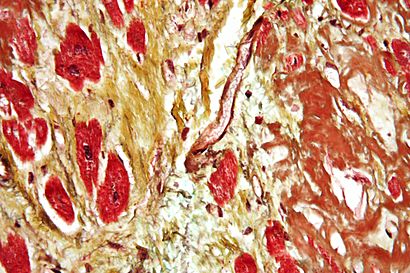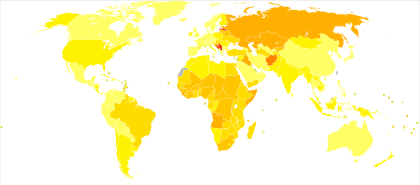Cardiovascular disease facts for kids
Quick facts for kids Cardiovascular disease |
|
|---|---|
 |
|
| Micrograph of a heart with fibrosis (yellow) and amyloidosis (brown). Movat's stain. | |
| Symptoms | Chest pain, shortness of breath, fatigue, loss of consciousness |
| Complications | Heart failure, heart attack, stroke, aneurysm, peripheral artery disease, sudden cardiac arrest. |
| Usual onset | Older adults |
| Types | Coronary artery diseases, stroke, heart failure, hypertensive heart disease, rheumatic heart disease, cardiomyopathy, Arrhythmia |
| Risk factors | Diabetes, high blood lipids, Poor weight, Smoking |
| Prevention | Healthy eating, exercise, avoiding tobacco smoke, limited alcohol intake, overall lifestyle changes |
| Treatment | Treating high blood pressure, high blood lipids, diabetes |
| Medication | Aspirin, beta blockers, blood thinners |
| Deaths | 17.9 million / 32% (2015) |
Cardiovascular disease (CVD) is a group of health problems that affect your heart and blood vessels. These diseases can make it hard for your heart to pump blood. They can also make it difficult for blood to flow through your body.
Some common types of CVD include coronary artery diseases. These are problems with the blood vessels that supply the heart. Examples are angina (chest pain) and myocardial infarction (a heart attack). Other CVDs include stroke, heart failure, and hypertensive heart disease. This last one is caused by high blood pressure.
Many things can cause CVD. For example, a condition called atherosclerosis can develop. This is when fatty stuff builds up in your arteries. This buildup can be caused by high blood pressure or smoking. Other causes include diabetes mellitus, not enough exercise, and obesity. A diet high in unhealthy fats and poor sleep can also contribute.
The good news is that most CVD can be prevented. You can lower your risk by making healthy choices. This includes eating well and being active. Treating conditions like high blood pressure and diabetes also helps. If you have a strep throat infection, getting it treated with antibiotics can prevent rheumatic heart disease.
CVD is a major cause of death worldwide. In 2015, it caused 17.9 million deaths. This was about 32% of all deaths. Deaths from CVD have increased in many developing countries. However, rates have gone down in most developed countries. CVD usually affects older adults. For example, 85% of people over 80 in the United States have CVD.
Types of Cardiovascular Disease
There are many different types of cardiovascular diseases. Some affect the blood vessels, while others affect the heart itself.
Diseases of Blood Vessels
These are also known as vascular diseases. They affect the tubes that carry blood.
- Coronary artery disease: This affects the arteries that bring blood to your heart.
- Peripheral arterial disease: This affects blood vessels in your arms and legs.
- Cerebrovascular disease: This affects blood vessels that go to your brain. A stroke is an example.
- Aortic aneurysm: This is a bulge in the main artery of your body, the aorta.
Diseases of the Heart
These diseases directly affect the heart muscle or its parts.
- Cardiomyopathy: These are diseases of the heart muscle itself.
- Hypertensive heart disease: This happens when high blood pressure damages the heart.
- Heart failure: This means the heart cannot pump enough blood for the body's needs.
- Cardiac dysrhythmias: These are problems with the heart's rhythm. The heart beats too fast, too slow, or irregularly.
- Inflammatory heart disease: This means parts of the heart become inflamed or swollen.
- Endocarditis: Swelling of the inner lining of the heart.
- Myocarditis: Swelling of the heart muscle.
- Valvular heart disease: Problems with the heart valves, which control blood flow.
- Congenital heart disease: Heart problems that someone is born with.
- Rheumatic heart disease: Damage to the heart from rheumatic fever. This can happen after an untreated strep throat infection.
Preventing Cardiovascular Disease
You can prevent up to 90% of cardiovascular diseases. This means avoiding things that increase your risk. Here are some ways to keep your heart healthy:
- Eat a healthy diet: Choose foods like fruits, vegetables, and whole grains. Diets like the Mediterranean diet or plant-based diets are good options.
- Choose healthier fats: Replace unhealthy fats (like saturated fats) with healthier ones. These are found in vegetable oils.
- Manage your weight: If you are overweight, losing some weight can help. This often involves eating better and being more active.
- Avoid tobacco smoke: Stopping smoking is very important. Also, avoid being around second-hand smoke. This can lower your risk by about 35%.
- Exercise regularly: Try to get at least 150 minutes (2 hours and 30 minutes) of moderate exercise each week.
- Control blood pressure: If your blood pressure is high, work with a doctor to lower it. Even a small drop can reduce your risk.
- Reduce stress: Try to manage psychological stress. Too much stress can affect your heart health.
- Get enough sleep: Adults need about 7–9 hours of sleep each night. Not getting enough sleep can raise blood pressure.
Combining these healthy habits is the best way to protect your heart.
Managing Cardiovascular Disease
If someone has cardiovascular disease, there are ways to manage it. The first steps often involve changes to diet and lifestyle. Getting a flu shot can also help. It may lower the chance of heart attacks and strokes in people with heart disease.
Doctors can use different treatments depending on the specific CVD.
- For problems with heart valves, surgery might be needed to replace them.
- If someone has abnormal heart rhythms (arrhythmias), a pacemaker can be put in. This small device helps control the heart's beat.
- For a heart attack, there are procedures like coronary angioplasty. This opens blocked arteries. Another option is coronary artery bypass surgery. This creates new paths for blood to flow around blockages.
Treating conditions like high blood pressure, high blood fats, and diabetes is also very important. Medications like aspirin, beta blockers, and blood thinners might be prescribed. These medicines help manage the disease and prevent further problems.
See also
 In Spanish: Enfermedades cardiovasculares para niños
In Spanish: Enfermedades cardiovasculares para niños
 | Madam C. J. Walker |
 | Janet Emerson Bashen |
 | Annie Turnbo Malone |
 | Maggie L. Walker |


